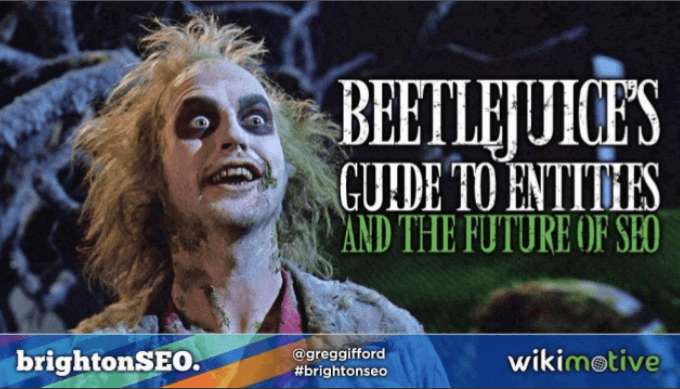It’s time to think of the future of SEO. What should we focus on? It’s time to find out more about entities and how they affect our SEO strategies.
Brighton SEO is an exciting conference for everyone who wants to find out more about the latest trends and tactics in all things SEO. No matter how experienced you are, there’s always a session to inspire you to try out new ideas.
Greg Gifford, Vice President of Search at Wikimotive, talked about entities and the future of SEO.

Defining entities for SEO
Google is considering an entity a thing or concept that is singular, unique, well-defined, and distinguishable. In fact, according to Greg Gifford, entities are the most important concept in SEO.
It was back in 2012 that Google moved to entity search. Real-world entities and their relationships started being ranking signals. A year later, Google started focusing on the semantics to make its ranking algorithm smarter. Then we found out in 2015 that ranking search results started being based on entity metrics.
Thus, it’s time to start focusing more on entities and how they affect our SEO.
It’s useful to remember then that every site consists of numerous entities. The internal links are simply the relationships between entities. Our content is simply made up of entities and their relationships.
The future of search
When thinking of the future of search, we need to keep in mind that Google is becoming smarter.
Here are Gifford’s tips that will future-proof your SEO strategy:
- The ranking will be more about real-world signals. This means that we need to explore the right balance between our current SEO tactics and the brand we are building with old-school marketing.
- Voice search is all about the intent of conversational queries. Conversational content will become very important.
- Mobile search will continue to make local SEO vital for everyone. Consuming content through mobile phones is pushing us to think of our mobile strategies and how we can improve them. In fact, local SEO will be the key to our future success. As Greg Gifford reminds us, links from local businesses will matter even if they are unrelated to your business.
- Google My Business is your direct interface to Google’s entity information about your business. It is further blending into mobile SERPs that will blur the lines even more between online and offline actions. In fact, real-world offline actions related to business entities will help your ranking.
- Start writing content that answers questions in a unique way. It’s helpful to read your content out loud. Conversational content will help you master the new world of entities and their relationships that affect ranking.
- Another excellent tip that can be very helpful is to think like you’re targeting rich snippets. It’s not the goal but it’s the right mindset to help you create more relevant content.
Four things we need to stop doing in SEO
According to Greg Gifford, we need to stop doing these things that will affect the future success of our SEO strategy:
1. Stop concentrating on keyword matching
SEO will be less about writing content with the right keywords and more about having the best answer based on the intent of the search.
2. Stop concentrating on single pages
Build your entity and pay attention to how it’s connected to other entities instead.
3. Stop thinking about optimizing individual page elements
The optimization should not focus on one page but rather on the overall entities and how their relationships can improve your success.
4. Stop concentrating on link building as the most important SEO tactic
Links will probably always matter but will be less important as Google gets better at understanding entity signals.
Focus on the entities and their relationships
There are many interesting takeaways from this session in Brighton SEO that can be useful when planning your strategy for 2020.
- Make sure you’re paying attention to local SEO.
- If you want to improve your online business, focus on the right balance between offline and online relationship building.
- Mobile search will be more important than ever so make sure you create content for mobile users.
- Your content should be conversational. Don’t be afraid to read it out loud before you publish it.
- There’s no need to spend too much time on individual pages and keywords if you forget to look at the bigger picture.
You can also find the session’s slides here for more details.
What future trends can you spot for SEO in 2020? Share them in the comments.
The post Why we need to think of entities and the future of SEO appeared first on Search Engine Watch.
from Search Engine Watch https://ift.tt/2l25Fdw
Comments
Post a Comment